The 1960s in America was a transformative decade marked by significant social and political upheaval.
During this period, the civil rights movement gained momentum, advocating for equal rights and opportunities for African Americans, while the feminist movement sought to address gender disparities and discrimination against women.
The historical context, pivotal events, and the importance of joining the accountability for equal rights for women and against racism during the tumultuous 1960s.
The Civil Rights Movement in the 1960s
The civil rights movement of the 1960s was a critical chapter in American history.
African Americans, led by prominent figures such as Martin Luther King Jr., Rosa Parks, and Malcolm X, fought against racial segregation, discrimination, and violence.
They demanded equal treatment under the law and the dismantling of Jim Crow laws that enforced racial segregation in public facilities and schools.
Pivotal Events in the Civil Rights Movement
Montgomery Bus Boycott (1955-1956)
The movement gained significant traction with the Montgomery Bus Boycott, sparked by Rosa Parks' refusal to give up her seat to a white passenger. The boycott lasted for 381 days and ultimately led to the Supreme Court ruling that racial segregation on public buses was unconstitutional.
March on Washington (1963)
In August 1963, over 200,000 people participated in the March on Washington for Jobs and Freedom.
Martin Luther King Jr.'s iconic "I Have a Dream" speech became the symbol of the movement's nonviolent resistance and collective aspirations for racial equality.
Civil Rights Act of 1964
One of the movement's most significant victories came with the passage of the Civil Rights Act in 1964.
This landmark legislation prohibited discrimination based on race, color, religion, sex, or national origin, and it ended racial segregation in public places.
The Feminist Movement in the 1960s
As the civil rights movement made strides, women's rights advocates were also fighting for gender equality.
The feminist movement sought to challenge the traditional gender roles, address workplace discrimination, and advocate for reproductive rights.
Pivotal Events in the Feminist Movement
![Equal-Rights-for-Women-and-Against-Racism]()
The Feminine Mystique (1963)
Betty Friedan's influential book, "The Feminine Mystique," sparked conversations about the discontentment and limited roles many women faced within the confines of domesticity. It ignited a new wave of feminism, encouraging women to seek opportunities beyond homemaking.
Equal Pay Act of 1963
In an effort to combat wage disparities based on gender, the Equal Pay Act was signed into law in 1963. It aimed to ensure that men and women receive equal pay for equal work.
National Organization for Women (NOW) Founding (1966)
NOW was established in 1966 to promote women's rights, address workplace discrimination, and advocate for gender equality within the legal system.
Intersectionality: The Overlapping Struggle
It is essential to recognize that the struggles for civil rights and women's rights were interconnected. African American women, like Fannie Lou Hamer and Dorothy Height, played significant roles in both movements, facing compounded discrimination based on both race and gender.
The Importance of Accountability Today
Though progress has been made since the 1960s, the fight for equal rights for women and against racism is far from over.Inequalities persist in various forms, from the gender pay gap to racial disparities in education and criminal justice. As a society, we must remain accountable and committed to creating a more just and equitable world.
The 1960s in America marked a time of immense change, driven by the civil rights movement and the feminist movement.
These struggles for equal rights for women and against racism were intertwined and laid the groundwork for greater social and political awareness.
It is crucial that we continue to recognize the significance of this era, join the ongoing fight for equality, and hold ourselves accountable to ensure a more inclusive and equitable future for all.

-1754363168-q80.webp)
